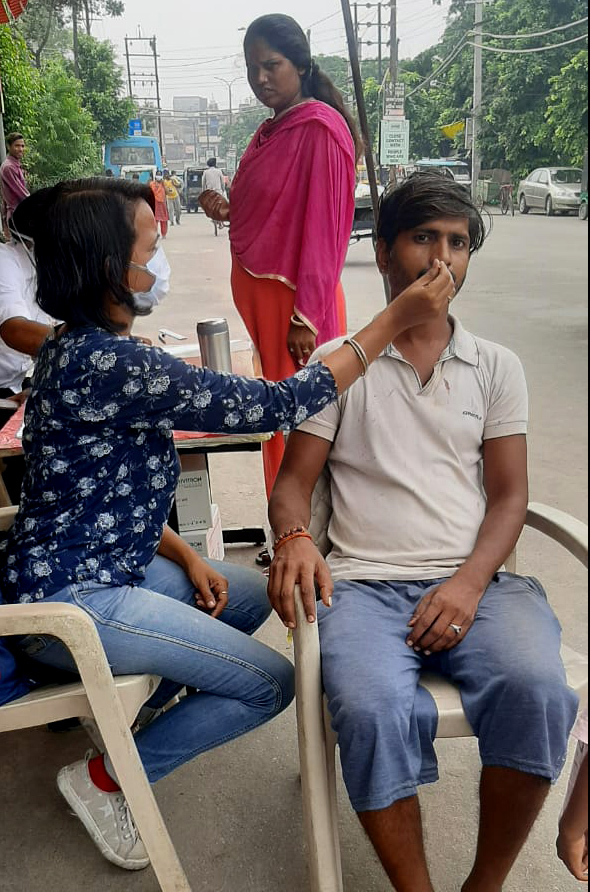
A health worker takes a sample of a resident for Covid test in Ludhiana on Thursday. Photo: Inderjeet Verma
NITIN JAIN
TRIBUNE NEWS SERVICE
LUDHIANA, SEPTEMBER 23
The government has confirmed that Delta continues to remain the most dominant Covid variant of concern (VoC) and has been spreading fast in Punjab as the United Kingdom’s Alpha variant disappeared after dominating the state till March.
A whopping 95.5 per cent of the total Covid samples processed for whole genome sequencing (WGS) in July tested positive for the Indian VoC (B.1.617), which had been christened Delta, the official figures revealed.
However, no fresh case of highly-contagious and dreaded new Covid variant Delta Plus (B.1.617.2), which is a mutated form of Delta and is gradually spreading fast to several other countries, claiming many lives, after being first found in India, has been reported in the state.
Till now, only two Delta Plus cases, one each in Ludhiana and Patiala districts, were reported in June. The data analysed by the Health and Family Welfare Department, available with The Tribune, showed that a total of 2,863 Covid samples were sent for the WGS from January to July, of which 2,539, accounting for 88.9 per cent, were processed, and 2,284, which accounted for 90 per cent, tested positive for the VoCs.
The month-wise break-up of the VoCs suggested that all 90 of the total 108 samples, accounting for 83.3 per cent, processed in July tested positive for the VoCs, of which 86 tested positive for Delta, accounting for 95.5 per cent, while two samples were that of Beta A, 2.2 per cent, and one each sample tested positive for B.1 and B.1.36, which accounted for 1.1 per cent each.
In June, 319 samples were processed, of which 288, which accounted for 90.3 per cent, tested positive for the VoCs. Of these, 277 samples, accounting for 96.2 per cent tested positive for the Delta, followed by four for B.1 (1.4 per cent), two each for Alpha (0.7 per cent), Beta A (0.7 per cent), and only one sample tested positive for the Beta B (0.3 per cent each).
In May, 617 of the total 652 samples, which accounted for 94.6 per cent, tested positive for the VoCs. Of these, 547 cases, accounting for 88.6 per cent, were of the Delta, followed by 41 cases for the B.1 (6.6 per cent), 23 cases of the Alpha (3.7 per cent), and two cases were of the Delta Plus variant (0.3 per cent).
In April, 458 of 493 WGS samples had tested positive for the VoCs, which accounted for 92.9 per cent. Of these, 209 cases, accounting for 45.6 per cent, tested positive for the Delta, 191 cases (41.7 per cent) for the Alpha, and 50 cases (11 per cent) were of the B.1.
In March, 715 of 763, which accounted for 93.7 per cent, samples tested positive for the VoCs. Of these, 678 cases, accounting for 94.8 per cent, had tested positive for the Alpha, four cases (0.5 per cent) for the Delta, two cases (0.3 per cent) for the Beta, one case each (0.1 per cent) for the B.1 and B.1.36.
In February, all 24 WGS samples had tested positive for the VoCs, which accounted for 100 per cent. Of these, 17 cases, accounting for 70.8 per cent, had tested positive for the Alpha and seven cases (29.2 per cent) for other mutations.
In January, 24 of the total 48 samples processed for the WGS tested positive for the VoCs. Of these, seven cases, accounting for 29.2 per cent, were of the B.1, 4 cases (16.7 per cent) of the B.1.36, two cases each (8.3 per cent) of the Alpha and B.1.258.14, and one each (4.2 per cent) of the B, A, B.1.36.19, B.1.36.8, B.1.459, B.1.465, B.1.596, B.1.1, and B.1.216.
Join Whatsapp Channel of The Tribune for latest updates.



























